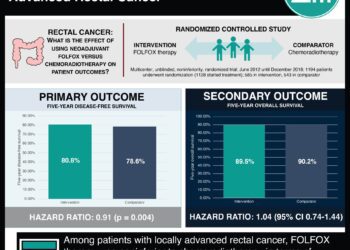Comprehensive recovery pathway improves patient outcomes in colorectal surgery
1. Length of stay, surgical site infection rate, and direct cost of care all improved with implementation of a colorectal CUSP recovery pathway.
2. Accountable implementation at all levels of staff with pre-operative education, mechanical bowel prep and chlorhexidine bathing were among the variety of interventions included in the study.
Evidence Rating Level: 1 (Excellent)
Study Rundown: There are millions of people who suffer due to preventable medical errors in the United States annually. Since the Institute of Medicine’s 2001 report “To Err is Human” there have been significant efforts made to reduce errors across all medical arenas. Comprehensive Unit Based Safety Program (CUSP) teams, originally designed for Intensive Care Units, represent a multidisciplinary approach to improve surgical care, teamwork and patient safety. In this prospective randomized single center study, the CUSP team approach was assessed for its ability to improve rates of surgical site infection and length of stay, and hospital costs in colorectal surgery patients.
Strengths of the study included a large sample size, long term follow-up, and substratification across multiple variables. Limitations included a single center study that has not yet been reproduced more broadly and the inability to assess which interventions were most effective in improving outcomes. Further studies may also highlight if the CUSP approach is more broadly applicable to other surgical specialties.
Click to read the study in the Journal of the American College of Surgeons
Relevant Reading: The effectiveness of strategies to change organizational culture to improve healthcare performance
In-Depth [randomized controlled trial]: A total of 640 patients were included in study analysis from recruitment at the Johns Hopkins Hospital. Colorectal surgery patients were selectively randomized to either go on the CUSP colorectal pathway (330 patients) or the standard recovery pathway (310 patients). In the CUSP pathway, all staff including colorectal surgeons, anesthesiologists, midlevel providers, and staff communicated to form a standardized approach that centered on having all patients treated in the same post-op inpatient unit to minimize variability in care. They also implemented a system whereby the same nurse anesthetists worked all of the colorectal surgery cases to minimize variability in the operating room. All patients also received pre-operative education regarding their procedure and completed satisfaction surveys to analyze quality. Patients were given mechanical bowel preps with oral antibiotics pre-op, chlorhexidine baths, and use of forced air warming devices pre-operatively among other interventions. Primary outcomes were length of service (LOS), surgical site infection (SSI) rates, urinary tract infections, venous thromboembolism (VTE) rates, patient experiences, and variable direct costs.
Between the study groups, SSI rate (standard 18.8% vs. CUSP 7.3%, p < 0.05), direct costs ($10 933 vs. CUSP $9036, p < 0.05) and LOS (reduced from 7 to 5 days, p < 0.05) were statistically significant. Other areas that were reduced but not significant included VTE rate (3.5% vs. 1.6% CUSP p > 0.05) and UTI rate (4.1% vs. 1.6% CUSP, p > 0.05). Patients who did the HCAPHS(Hospital Consumer Assessment of Healthcare Providers and Systems) survey reported subjective improvement in staff responsiveness (34% CUSP vs. 24% standard), communication (71% CUSP vs. 52% standard), and pain management (77% CUSP vs. 68% standard) with greater than 90% of patients who would recommend the hospital to their friends and family.
Image: PD
©2015 2 Minute Medicine, Inc. All rights reserved. No works may be reproduced without expressed written consent from 2 Minute Medicine, Inc. Inquire about licensing here. No article should be construed as medical advice and is not intended as such by the authors or by 2 Minute Medicine, Inc.



![The ABCD2 score: Risk of stroke after Transient Ischemic Attack (TIA) [Classics Series]](https://www.2minutemedicine.com/wp-content/uploads/2013/05/web-cover-classics-with-logo-medicine-BW-small-jpg-350x250.jpg)



